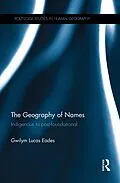This book provides cutting edge theoretical and critical analysis of current debates within toponomy. This book examines the use of naming as a primary tool for making sense of complex lifeworlds and livelihood systems, arguing that the concept of the name is inherently spatial and visual in nature. It positions itself at the intersection of traditional approaches to toponymy, that focus on cartographic and technical aspects of place naming, and critical approaches, that examine the political aspect of place name practices, power and people. It opens up new spaces of enquiry beyond these two perspectives to explore the idea of naming as applied to the world at large, focusing on names as referents applied to a range of phenomena including not only places but also people, objects, and abstract ideas. This book provides a naming toolbox that is at one philosophical, religious, political, practical, and scholarly, and contains examples from Canada, the Middle East and the UK and indigenous communities. It will be of great interest to those working in geography, cartography, anthropology, and cultural studies.
Autorentext
Gwilym Lucas Eades is Lecturer in Human and Environmental Geography in the Department of Geography at Royal Holloway University of London, where he is also on the Information and Communication Technologies for Development (ICT4D) management board and director of the GeoVisual Methods Lab (GVML).
Zusammenfassung
This book examines geographical names, place-names, and toponymy from philosophical and cultural evolutionary perspectives. Geographical name-tracking-networks (Geo-NTNs) are posited as tools for tracking names through time and across space, and for making sense of how names evolve both temporally and spatially. Examples from North and South American indigenous groups, the Canadian arctic, Wales, England, and the Middle East are brought into a theoretical framework for making sense of aspects of place-naming practices, beliefs, and systems. New geographical tools such as geographic information systems (GIS) and global positioning systems (GPS) are demonstrated to be important in the production and maintenance of robust networks for keeping names and their associated meanings viable in a rapidly changing world where place-naming is being taken up increasingly in social media and other new mapping platforms. The Geography of Names makes the case that geographical names are transmitted memetically (i.e. as cultural units, or memes) through what Saul Kripke called communication chains. Combining insights from Kripke with views of later Wittgenstein on language and names as being inherently spatial, the present work advances theories of both these thinkers into an explicitly geographical inquiry that advances philosophical and practical aspects of naming, language, and mapping.
Inhalt
1. Geographical Naming and Necessity
2. Indigeneity and Geographical Naming
3. Religion and Geographical Naming
4. The Neurogeography of Names
5. The Political Geography of Names
6. Neogeographies of the Name
7. Toward a Geographical Name-Tracking-Network
